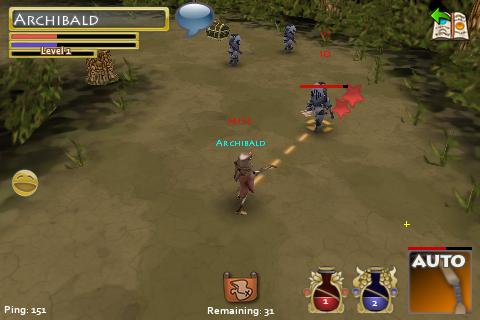 As the recent game announcements have been multiplying, Mobile is the new frontier for online games and MMOs. The technical constraints have been mostly overcome, and the apparition of a hardcore audience playing mostly from home has made the main problem (good enough ping) less painful. The possibility of free apps with in-app purchases have finally make the business part of it sensible. It’s thus no surprise that many games are announced. However, as games like Pocket Legends find success, the room for growth is increasingly moving, like for social games, to outside of the US/English-speaking territories. What’s the market looking like in Europe? Read more
As the recent game announcements have been multiplying, Mobile is the new frontier for online games and MMOs. The technical constraints have been mostly overcome, and the apparition of a hardcore audience playing mostly from home has made the main problem (good enough ping) less painful. The possibility of free apps with in-app purchases have finally make the business part of it sensible. It’s thus no surprise that many games are announced. However, as games like Pocket Legends find success, the room for growth is increasingly moving, like for social games, to outside of the US/English-speaking territories. What’s the market looking like in Europe? Read more
As a follow-up from my previous blog post, intentionally quite theoretical, I thought I would give two very specific examples of what I consider good development to push the service side of a game.
While a lot can be done to improve the quality of the service of a game, I really believe that it is when a company is dedicating its most precious resource (developers) on pushing the level of the service quality that you know it has a genuine will to develop a service strategy. More than, say, opening a dedicated Customer Support department with hundreds of dedicated staff and limit the developers to only build new content and gameplay features.
It may be biased by my own personal experience, but I have seen a bit too often CS departments used as a stop gap for development shortcomings. It is too common to see a bug left unfixed by the development team, that would require a couple of days of an engineer’s time at worst, to have hundreds of hours of CS staff spent hotfixing the issue. But I digress.
 I am a regular speaker at game related events, and there are a lot of topics I am very keen to weigh in on. Last year, I decided to tackle the notion of Game as a Service. It is difficult to convey how important this topic is for me and how much I feel we need, as an industry, to improve on that front, but I went for it and tried to cover it all in the allotted hour.
I am a regular speaker at game related events, and there are a lot of topics I am very keen to weigh in on. Last year, I decided to tackle the notion of Game as a Service. It is difficult to convey how important this topic is for me and how much I feel we need, as an industry, to improve on that front, but I went for it and tried to cover it all in the allotted hour.
It proved to be impossible to fit everything in, so after the first few iterations of the presentation, I did some pruning and made it leaner (and hopefully better). The first thing I cut was the definition of service. In retrospect, that topic alone could take up a good hour of discussion, and it was overly ambitious to include it with such limited time. So, I renamed the talk to “Your Game As A Service: Designing Beyond Gameplay” and focused it on the practical side of designing the player experience.
I do think that the definition of ‘game as a service’ could use some proselytism in the industry, although I have a hard time imagining conference attendees being willing to sit through an hour of theoretical discussion about it. So, here are some of my thoughts on the subject in easily digestible form.
 The recently launched RIFT, a big-budget subscription MMO, has been offering a very deep discount for 3- and 6-months subscriptions set up early (the Founder pricing, normally valid for the first 2 weeks after release, which has been extended to the end of March). Discounts for longer subscriptions are the norm in the industry, and such an offer has been proposed before by other games. These limited offer at a very low price are really interesting. Read more
The recently launched RIFT, a big-budget subscription MMO, has been offering a very deep discount for 3- and 6-months subscriptions set up early (the Founder pricing, normally valid for the first 2 weeks after release, which has been extended to the end of March). Discounts for longer subscriptions are the norm in the industry, and such an offer has been proposed before by other games. These limited offer at a very low price are really interesting. Read more
 A couple of weeks ago at GDC 2011 in San Francisco Cinco Barnes from Spacetime Studios talked about their experience with Pocket Legends on iOS and Android devices (the complete summary of the session is here) . As you might know, it is working out quite well for them, not just on iOS, especially expanding into Android territory gave revenues a huge boost. Surely a key factor of this success is delivering a quality product in a niche (it won’t be a niche much longer but while competition is getting tough on iOS, there is still a bit more room on Android) and getting the gameplay right for the audience.
A couple of weeks ago at GDC 2011 in San Francisco Cinco Barnes from Spacetime Studios talked about their experience with Pocket Legends on iOS and Android devices (the complete summary of the session is here) . As you might know, it is working out quite well for them, not just on iOS, especially expanding into Android territory gave revenues a huge boost. Surely a key factor of this success is delivering a quality product in a niche (it won’t be a niche much longer but while competition is getting tough on iOS, there is still a bit more room on Android) and getting the gameplay right for the audience.
In the Spacetime Studios case, some assumptions about how MMO’s should work on mobile platforms were spot on, some others were surprisingly wrong. I thought I would share the most notable.
 The predictions exercise, as we did last year and the year before, is becoming a bit more difficult as it seems we’re bound to repeat ourselves in some ways. The evolutions of the market are rarely totally surprising, and most of the major trends have been cooking for the past few years. This time, we really feel like most of the big changes are there indeed, as online gaming is finally becoming the mainstream, and industry actors following a traditional model are finally realizing they are in big trouble. Nevertheless, the evolutions are still very interesting to look at and comment. So, what do we think will be the main trends for 2011?
The predictions exercise, as we did last year and the year before, is becoming a bit more difficult as it seems we’re bound to repeat ourselves in some ways. The evolutions of the market are rarely totally surprising, and most of the major trends have been cooking for the past few years. This time, we really feel like most of the big changes are there indeed, as online gaming is finally becoming the mainstream, and industry actors following a traditional model are finally realizing they are in big trouble. Nevertheless, the evolutions are still very interesting to look at and comment. So, what do we think will be the main trends for 2011?
